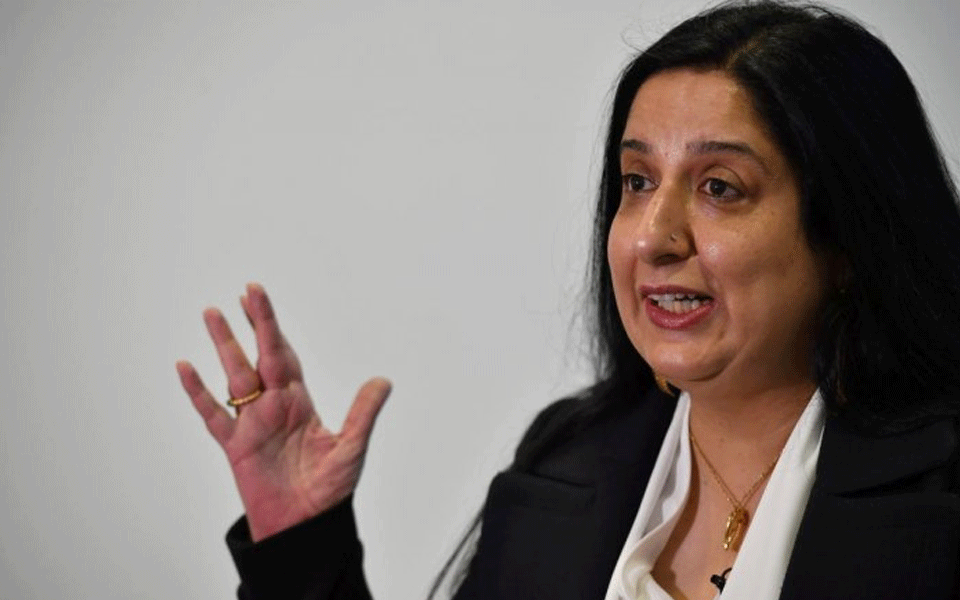London, Nov 9: An Indian freelance journalist, who has been the target of online trolling and harassment for her investigative reports, has bagged the 2018 London Press Freedom Award for Courage.
Swati Chaturvedi, author of the book 'I am a Troll: Inside the Secret World of the BJP's Digital Army', beat shortlisted journalists from Italy, Turkey and Morocco for her work in exposing the "IT cell" within the ruling Bharatiya Janata Party (BJP) for keeping an army of angry trolls.
"This means a lot. But I think it is very sad that you have to win an award for courage just for doing your job," Chaturvedi said at the first award ceremony organised by the UK chapter of Paris-based Reporters Sans Frontieres (RSF) or Reporters Without Borders in London on Thursday evening.
"The US President (Donald Trump) saying we are the enemy of state; in India last year journalist Gauri Lankesh being gunned down outside her house; it is very frightening. There is something clearly very wrong," she said.
"I don't think journalists have stopped what they are doing, but the governments across the world have become very intolerant of any criticism or scrutiny."
The columnist for print and broadcast media in India commended the work of organisations like the RSF, a non-profit organisation that works to document and combat attacks on journalists around the world.
Chaturvedi added: "I get a lot of online threats but if I let that affect me, I won't be able to do my job. It is heartening to see RSF speaking up for journalists because we have become an attacked, endangered species. At least there is someone advocating the rights of journalists."
"I think it is scary to be a journalist in today's world, especially if you are doing investigative journalism. But at the same time, it is very necessary," she said.
Chaturvedi was among four worldwide winners at the awards held at Getty Images Gallery in London.
"Recognising great journalism is important, not least because it sends a message of solidarity, proving that there is an international community will stand up for the free media no matter where it is threatened, or by whom," said RSF UK Bureau Director Rebecca Vincent.
The ceremony highlighted the importance of press freedom and safety of journalists, especially in the wake of the killing of Saudi Arabian journalist Jamal Khashoggi in the Saudi embassy in Istanbul last month.
Let the Truth be known. If you read VB and like VB, please be a VB Supporter and Help us deliver the Truth to one and all.
Hyderabad (PTI): Telangana Chief Minister A Revanth Reddy met Union Home Minister Amit Shah in Delhi on Wednesday night and urged him to increase the sanctioned strength of IPS officers to the state in view of its growing administrative and security needs.
The two leaders also discussed the recent surrender of several senior Maoist leaders before the Telangana Police and other issues.
"During the meeting, the two leaders discussed the issue of Maoist surrenders and their rehabilitation. The chief minister informed Shah that significant improvements in policing have taken place in Telangana over the past two years," an official release here said.
Highlighting that 591 Maoists have laid down their arms and joined the mainstream of society during this period, the chief minister said the state government was providing them compensation and rehabilitation assistance as per the rules.
He requested the Union home minister to extend financial support from the central government for development works in the backward regions of the state.
Reddy also urged Shah to increase the sanctioned strength of IPS officers to the state from 83 to 105 in line with the state's growing administrative and security needs, the statement said.
The first cadre review after the formation of Telangana was conducted in 2016, while the next review, due in 2021, was delayed and finally carried out in 2025. Even then, only seven additional IPS officers were allocated to the state, the chief minister informed Shah and requested that the third cadre review be conducted in 2026 as per the schedule.
Reddy explained that Telangana, like the rest of the country, is facing several modern challenges, including cybercrime, drug trafficking, white-collar crimes, and other emerging security threats.
He highlighted the reorganisation of the Hyderabad, Cyberabad, and Malkajgiri Police Commissionerates, the proposed formation of the Future City Commissionerate and the rapidly growing population in Hyderabad to underline the increasing administrative requirements of the state.





